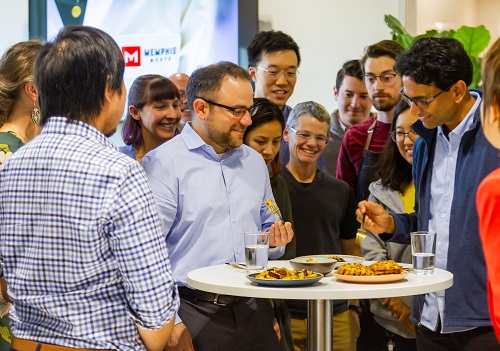Meat the Future brings audiences inside the world of Memphis Meats, an innovative startup producing “clean meat”, a meat substitute that is witnessing ever-growing interest from customers and investors alike (raising $17 million in 2017 in a Series A funding round from Bill Gates, Richard Branson and Cargill – the largest U.S. meat producer). If have their say, the lab-grown “cell-based” product will prove the future of meat substitutes. Of course, not without first tackling some challenges.
Want to learn more? Read our synopsis of the film – and then watch it online. Meat the Future is screening as part of the Hot Docs Canadian International Documentary Festival which is being broadcast online due to COVID-19. The film is also available at CBC Gem.
SEE Change spoke with its award-winning director Liz Marshall about the growing popularity of “clean meat” and what that says about evolving consumer demand. She also shares her thoughts on the obstacles facing Memphis Meats and how COVID-19 may have given lab-produced and other alternative meat products a boost.
Memphis Meats is not the only venture developing cell-cultured meat, but they’ve received some high-level backers. What do you think accounts for the growing support?
In 2017, food-tech startup company Memphis Meats secured historic funding that allowed the company to expand and focus on technological breakthroughs pertaining to scale – the ability to scale up production of “cell-based meat”. Investors included billionaire influencers Bill Gates and Richard Branson and meat industry giants Cargill, and then Tyson in 2018.
This was a very exciting twist in the story, as presented in Meat the Future. We didn’t expect or anticipate such rapid acceleration. The CEO and co-founder of Memphis Meats is Dr. Uma Valeti, a Mayo-clinic trained cardiologist, and his ‘big tent’ philosophy and approach -working with all stakeholders to move this industry forward- is strengthened by an exceptional team of scientists, business and food specialists. So, I think the recipe for success is a combination of Valeti’s visionary leadership, the brilliance of the team, and the timelines of the idea.
Meat the Future is not a story about disrupters taking on a dangerous villain, instead it is about an idea whose time has come. This past January, 2020, Memphis Meats raised $161 Million towards its first pilot production facility. Another historic milestone in the birth of this industry.
One of the biggest challenges is the cost of production. We see the cost falling throughout the movie (though the last number was bleeped on my screener; do we know what it is today?) Is it feasible that it will be reduced significantly over the next year?
Yes, chronicling this benchmark was a lot of fun, because it’s something that changed dramatically from 2016 – 2019. No spoilers here, sorry! People will need to watch the film to hear it and see it with their own eyes and ears! To give you a sense: In 2016, Memphis Meats unveiled the world’s first “cultured” meatball, and the cost of production was $18k USD per pound of beef. By 2017, the cost of production was less than half the cost, and in 2019 it was dramatically lower. Their goal is to be on par with conventional meat, or less, which will make scaling-up more achievable. They are well on their way, the story continues to unfold. Meat the Future is about the genesis phase of this revolutionary industry.
Another challenge is regulation and labeling. We witness pushback from farmers, meat lobbyists etc. Since the filming, has there been any movement on that end, to your knowledge?
This was another surprising story twist to follow. In 2018 things got exciting. In Washington D.C., we were on the ground with our cameras to witness historic meetings co-hosted by America’s food regulatory bodies, the USDA and the FDA, and people from across America voiced their questions, concerns and advocacy about cell-based meat (now also referred to as “cultivated meat”).
As you will see in Meat the Future, both the United States Department of Agriculture and the Food and Drug Administration want to regulate this new industry as quickly and as safely and fairly as possible. They want America to be first to market. Of course there is push-back from some, which was an opportunity for us to include dramatic tension and diverse voices. Ranchers and farmers are concerned about labelling, but not about competition. The regulatory path is still being clarified.
Do you believe this is the most practical way to move people away from eating meat? Vegetarianism/veganism seems to have its limitations.
Yes, I believe this is a pragmatic viable solution to the crisis we are in. It has taken innovative leaps and feats to meet the demands of a hungry growing world. Now, it will take new revolutionary food innovation to solve the problems we face. Cultivated meat is the next evolutionary step driven by human ingenuity.
Has COVID-19 added some weight to this conversation, as it’s growing harder to ignore the link between one’s eating habits and one’s health (the rising price of meat doesn’t help)?
The pandemic has put industrial meat production in the spotlight and Meat the Future is being released to the world at precisely the right moment, to help pique awareness, foster conversation, and inspire a sense of awe and wonder about what is possible. Cell-based meat could help prevent future zoonotic health pandemics like COVID-19, where disease and infection is passed from animals to humans. Cell-based meat production bypasses the breeding, confinement, and slaughter of animals.


